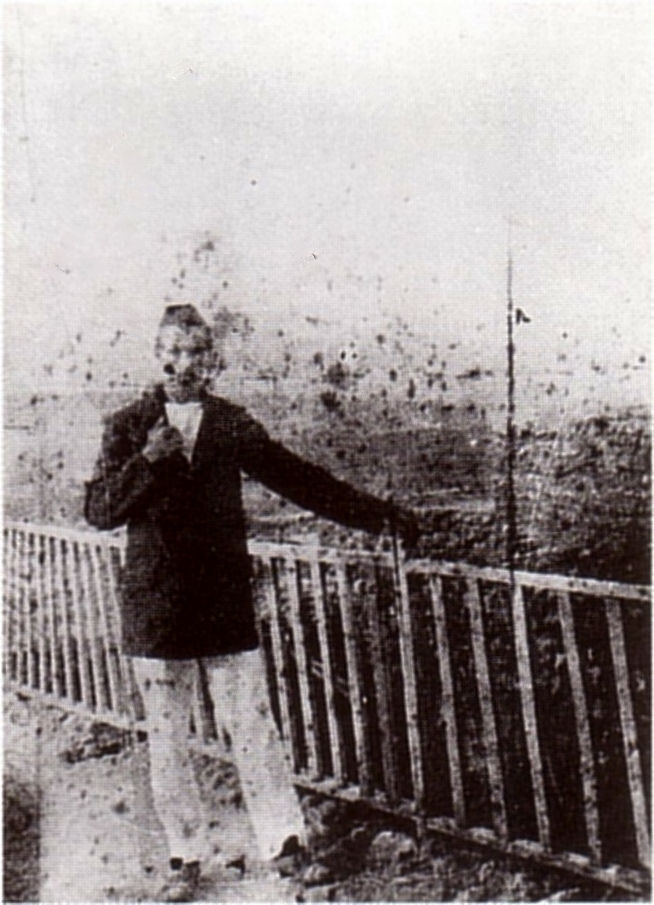Arthur Rimbaud
Controversial French poet, Arthur Rimbaud, (1854-1891) turned his back on the literary world in 1873 at age 20 and set off in search of fortune. In August 1880 he arrived in Aden and with introduction in hand approached Pierre Bardey, partner of Bardey & Co. The company was in the business of exporting coffee and other items from Aden from their 3-level property on Esplanade Road in Crater, close by the old solitary minaret of the former Manara Mosque, and facing Front Bay and Sirah Island. Young Rimbaud was employed as foreman in the coffee-sorting warehouse for 7 francs a day including board and lodging.
Nearly 20 years later Antonin Besse would tread the same path, arriving in Aden in 1899 to start his 3-year contract with Bardey & Co. Besse knew of Rimbaud and seemed to have little respect for his literary talents.
Coffee had become very popular in Europe, especially France, and it was widely known that the best coffee came from Yemen, a fact not lost on Lyon businessmen Alfred & Pierre Bardey. By 1880 around half the Yemen export coffee crop was sent to France, which had become much easier following the opening of the Suez Canal in 1869.
The coffee berries arrived in Aden from Yemen by camel. After the pulp was removed the beans were then cleaned, graded and packed for shipping to Marseille, France. The warehouse run by Rimbaud was known as the 'harem' as the cleaners, sorters and baggers were all female, mainly wives of the Indian soldiers. The hours were 7am to 5pm in conditions that were uncomfortable due to the dust and the heat inside up to 43°C.
Rimbaud sent many letters to his family and after the first month wrote that he was "very up to date on the present coffee trade. I have the absolute confidence of my employer." Yet Rimbaud hated Aden. He wrote, "Aden is a terrible rock, without a single blade of grass or a drop of good water. We sweat litres of water here every day."
It was with little surprise that when he heard that Bardey & Co. wanted to establish a branch in Harar, Abyssinia, he grasped the opportunity. So it was that at the end of November 1880 he set off for Harar, a three-week journey by sea, then on horseback across the desert. He did well in the Harar branch, trading not only in coffee but in hides and ivory. The coffee was shipped back to Bardey & Co. in Aden. Rimbaud's efforts were well recognised and in 1883 Alfred Bardey offered him an extension of his contract for a further 3 years.
Rimbaud eventually left Bardey's and went to work for another French exporter, César Tian. His dreams of making a fortune running guns for King Menelik II of Shewa were dashed when Menelik cheated him on the deal. Leaving Harar on April 7 1891 he had to be carried by litter to the coast, his leg swollen with a tumour. Back in Marseille his leg was amputated but the cancer was malignant and he died on November 10 1891 aged just 37.
Many people today who know of Rimbaud will refer to Rimbaud's House in Aden. This is rather an extension of the truth, as the house was never his and he only remained there as an employee for a short time. The house was actually rented by Bardey & Co. from a local Jewish businessman, Menachem Messa. The property was burned in the 1947 anti-Jewish riots and was subsequently renovated.
See photos below of Alfred & Pierre Bardey's premises in Crater now referred to as 'Rimbaud's House'.
"Basically we lead the most appalling life in the world here. We receive no newspapers, there are no libraries at all; as far as Europeans go, all we have are stupid shop employees who squander their salary on the billiard tables and leave this place cursing it". ~ Arthur Rimbaud - Aden, 15th January 1885
By 1955 coffee remained one of Aden's most valuable re-export commodities, earning over £3,000,000 in foreign currency. The main buyers had become U.S.A., Italy and Japan.

Bardey & Co Building in the Esplanade, Crater, Aden

Rimbauds' House (Bardey & Co) Esplanade Rd., Crater, Aden

Rimbauds' House (Bardey & Co) Esplanade Rd., Crater, Aden




There has been much speculation, debate and research on this old photograph and absolute certainty of the identities cannot be guaranteed. Photographer and African explorer Georges Révoil OR Dutrieux (left), Henri Lucereau (3rd from left), Arthur Rimbaud (2nd from right), Jules Suel owner of the hotel (checkered suit) and others at Hotel de L'Univers. Rimbaud at the time of this photo was 26 years old and recently arrived in Aden as the photo has been identified as being taken in August 1880